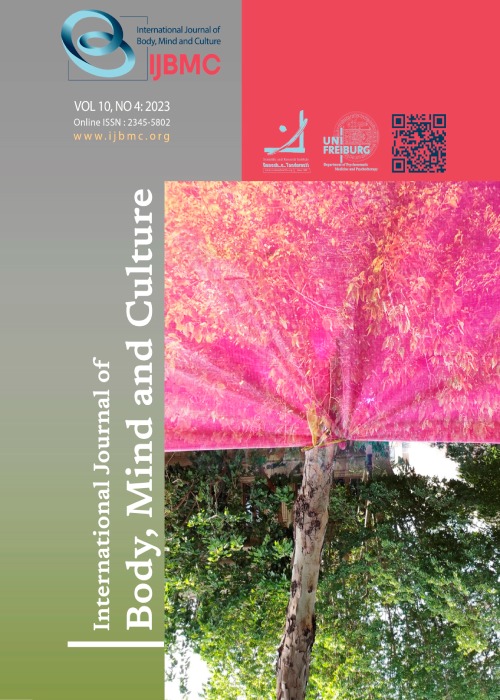فهرست مطالب

International Journal of Body, Mind and Culture
Volume:6 Issue: 3, Summer 2019
- تاریخ انتشار: 1398/05/19
- تعداد عناوین: 7
-
Pages 118-119
-
Pages 120-140
Balint Work is getting introduced and Balint Group Trials are being held in Iran in recent years. This is the first study of a Balint group trial participated by Iranian General Practitioners (GPs). This was a qualitative study to explore the themes which feature the GPs' described experience of their participation. A phenomenological approach was applied to examine the GPs' experience of participation in a seven-session Balint-group-trial. The participants were eight Iranian GPs working in the primary health-care network of Natanz-Iran. A focus group and in-depth semi-structured interviews were applied and the transcribed. Verbatim were analyzed through a phenomenological explorative and descriptive process by a three-membered research team. Three ground themes and four main-themes emerged as the main features through which the participant-GPs had explained their experience. The main themes were1) Improving the Skills and Wisdom of Doctor-Patient-Relationship, 2) Exceptional Training Method/Learning Experience, 3) Emotional healing for doctors, 4) Job Morality Inspirations. Iranian physicians described their participation in a Balint group trial as a missing, needed and valuable experience of different sort of a peer-discussion-group, an insight-inducing and skill-improving one and an emotionally-supportive one. Minor particularities and major similarities were found between the participation experience as portrayed by Iranian physicians and by physicians of other countries. The study also adds a demonstration of the trans-cultural nature of the Balint group experience.
Keywords: Qualitative, Balint Group, Experience, General Physician, Iran -
Pages 141-151Background
It has been suggested that many participants in weight management programmes are unable to achieve the permanent emotional and psychological changes necessary for long-term weight loss maintenance because of their having unrecognised, unresolved childhood food, eating, or weight associated traumas that continue to influence their adult eating habits and body self-image, and impair their weight reduction efforts. Hypnosis is now accepted as a valuable tool in the management of many chronic clinical conditions because of its efficacy in producing remedial behavioural change in individuals with seemingly intractable health problems. Hypnosis would therefore seem to be an ideal tool for identifying and resolving possible childhood obesogenic subconscious agendas, and in helping individuals with refractory obesity to minimise any recidivistic weight regain.
MethodsSeven participants with refractory obesity agreed to undertake a series of regression hypnosis sessions designed to allow them to search for childhood and teenage experiences that might be contributing to their current inability to lose weight.
ResultsDuring their hypnosis sessions, each of these participants was able to recall childhood or early adulthood memories of emotional traumas or parental disharmony, which resulted in their making aberrant decisions at that time about their food preferences, eating habits, or their chosen body image. These episodes had subsequently become subconsciously internalised, but had gone on to have a significant and lasting, detrimental effect into their adult years, leading to their subsequent adult obesity.
ConclusionThis study has shown how covert, long-forgotten childhood emotional experiences can play an aetiological role in refractory adult obesity. It has also demonstrated the cathartic role of regressive, exploratory hypnosis in bringing to light such unresolved traumas in order for them to be discharged, and thereby, in facilitating future efficacious weight loss management.
-
Pages 152-159
the rate of psychological health and stress. It explored the effect of different methods of coping with stress. It also examined the effect of the stress management training program on stress reduction in parents with mentally disabled children.
MethodsThe parents of mentally disabled children in Rafsanjan city, Iran, (2 health centers) filled out Harry’s stress inventory (HSI) and the General Health Questionnaire (GHQ). Sixty couples with the highest score were selected and randomly divided into 2 groups. The experimental group passed the stress management course in 6 sessions for 3 weeks in the rehabilitation center. The control group received no treatment. After the last session and 1 month after the last session, the two groups completed the two questionnaires again. Data were analyzed using analysis of covariance (ANCOVA) in SPSS software.
ResultsThere was a significant difference between the pretest and posttest mean scores of stress in the experimental group (P < 0.001); however, this difference was not significant in the follow-up test (P > 0.659). The mean score of psychological health differed significantly between the pretest and posttest in the experimental group (P < 0.001); however, this difference was not significant in the follow-up test (P > 0.646).
ConclusionTraining helps the mothers of mentally disabled children better understand themselves, identify their strengths and weaknesses, find themselves, and commit themselves to improving their weaknesses and developing their strengths. Consequently, they can better accept realities and reduce their psychological stress.
-
Pages 160-167Background
Pregnancy is considered as a period of vulnerability in women, which presents new problems and difficulties to mothers that may impair their mental health. The purpose of this study was to determine the effectiveness of mindfulness training on self-compassion, sexual satisfaction, and resilience in pregnant women.
MethodsThis quasi-experimental study was performed as a pretest-posttest design with control and experimental groups. The sample of this study consisted of 30 people who were selected using convenience sampling method and were randomly divided into experimental (30 subjects) and control groups (30 subjects). The measurement tools used included the Self-Compassion Scale (SCS), Index of Sexual Satisfaction (ISS), and Connor-‎Davidson Resilience Scale (CD-RISC). First, pretest was performed in both groups. Then, the training was performed in the experimental group in 8 sessions (90 minutes). Subsequently, the posttest was conducted in both groups, and a month later, the follow-up was implemented. Data were analyzed using multivariate analysis of covariance (MANCOVA) and one-way analysis of covariance (ANCOVA).
ResultsThe results showed that mindfulness training was effective on self-compassion, sexual satisfaction, and resilience in pregnant women.
ConclusionThe results of this study showed that mindfulness training is effective in promoting self-compassion, sexual satisfaction, and resilience in pregnant women.
Keywords: Mindfulness Training, Self-Compassion, Sexual Satisfaction, Resilience, Psychological, Pregnant Women -
Pages 168-175Background
Happiness is the most basic requirement of human mental health. The health of medical students who deal with the health of the community is very important. The aim of this study was to compare the happiness of students in different fields in Shahid Beheshti University of Medical Sciences, Tehran, Iran.
MethodsThis descriptive-analytic study was performed on 100 medical, dental pharmacy, nursing, and health students in Shahid Beheshti University of Medical Sciences in 2019. The data were collected using the Iranian euphoria questionnaire.
ResultsAll students obtained an average happiness score. The highest level of happiness was related to dentistry and the lowest was related to nursing and health. There was no significant difference in the level of happiness among students in different disciplines, and it did not correlate with gender, marital status, educational status, place of birth and residence, mother's education, number of children in the family, and employment. There was a significant relationship between happiness and father's education (P = 0.02) and satisfaction with the field of study (P = 0.003).
ConclusionConsidering the moderate level of happiness observed in this study and the direct effect of students’ happiness on the future of the society, in order to educate a more productive generation, it is necessary to take measures to increase happiness and determine the factors affecting it. Creating job opportunities and valuing different jobs can increase the happiness of these students, which requires further in-depth studies.
Keywords: Happiness, Students, University Medical Centers -
Pages 176-181
The Department of Clinical Psychology was found at the School of Medicine in 2011 to achieve its prime objectives of teaching and research in the field of clinical psychology. Since 2012, in addition to educating postgraduate students...


